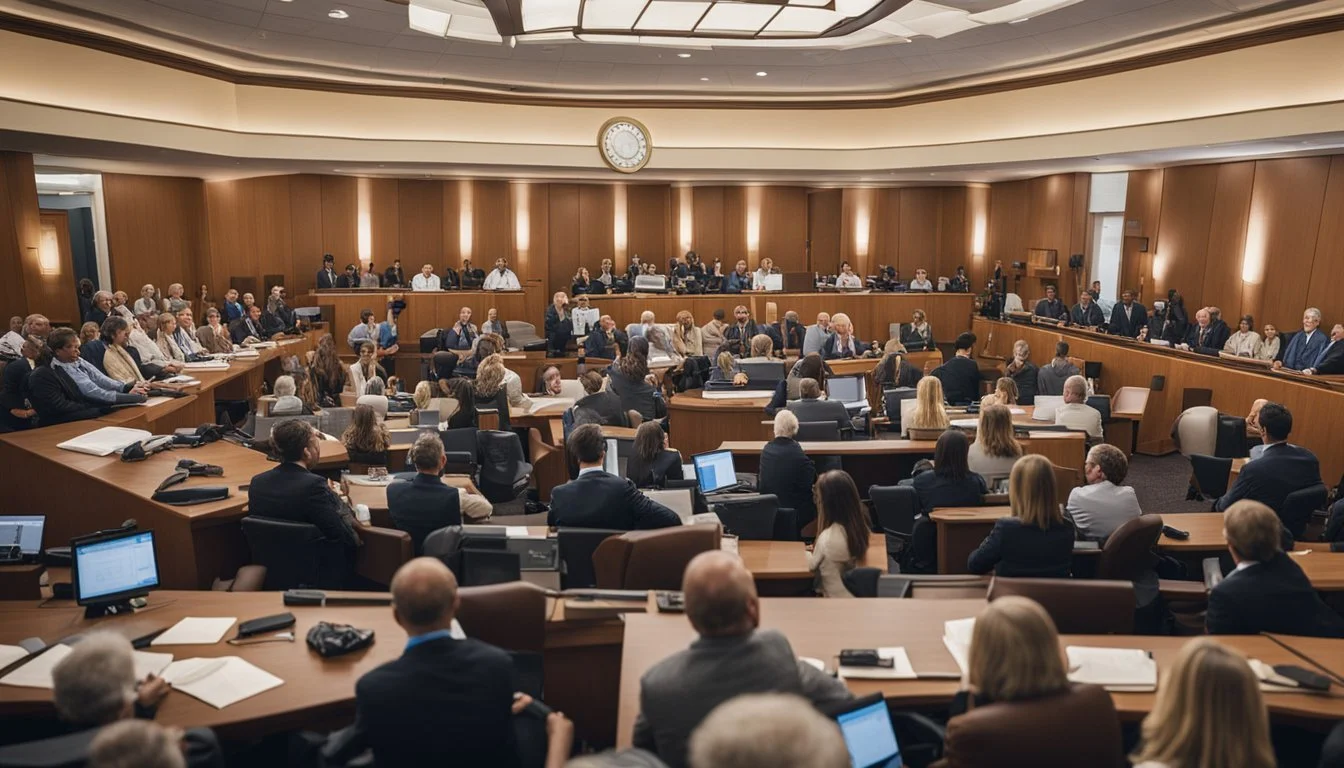10 True Crime Documentaries on Ponzi Schemes in Florida
Insider Stories and Shocking Scams
Ponzi schemes in Florida have captured the public's fascination, reflecting a broader curiosity about financial deceit and its consequences. These schemes often involve elaborate ruses designed to lure investors with promises of high returns, only to collapse and leave many in financial ruin. Documentaries on such schemes provide a window into the meticulous planning and relentless deceit employed by fraudsters.
Why are Ponzi schemes particularly prevalent in Florida? Florida's growing prominence as a hub for retirees and businesses creates an attractive target for white-collar criminals. Financial fraud documentaries covering this area illustrate the significant impact on the victims and the eventual downfall of the perpetrators, making them essential viewing for anyone interested in the mechanics of financial crime.
1) The Missing Billions: The Ponzi Tale of Arthur Nadel
Arthur Nadel, once a respected hedge fund manager and philanthropist, orchestrated one of Florida's most infamous Ponzi schemes. Known as the "Mini-Madoff," Nadel managed to amass millions from his unsuspecting investors. He disappeared in early 2009, taking with him around $168 million of investor funds.
Nadel was eventually captured and indicted on multiple federal counts, including securities fraud, wire fraud, and mail fraud. His arrest brought to light the staggering scope of his deception. Investors had trusted him, believing in the high returns he had promised.
In 2010, Nadel was convicted and sentenced to prison. He spent his final years at the Butner prison complex, where he died in 2012. His downfall left many of his victims struggling to recover their losses.
The documentary "The Missing Billions: The Ponzi Tale of Arthur Nadel" delves deep into this complex story. It explores how Nadel managed to deceive so many and the devastating impact on his victims. Through interviews and detailed accounts, the film paints a clear picture of his fraudulent activities and the aftermath.
For more information on the film, visit IMDb.
2) Operation: Green Energy - Ponzi in the Sunshine State
Operation: Green Energy highlights a significant Ponzi scheme set in Florida. The film focuses on a fraudulent green energy company that manipulated investors out of millions. Promising high returns and tax breaks on solar investments, the scheme attracted numerous unsuspecting victims.
The fraudulent company took advantage of the growing interest in renewable energy. By exploiting green energy incentives, they crafted a scam that seemed legitimate to investors. This facade of eco-friendly practice masked the underlying Ponzi structure.
The documentary provides an in-depth look at how the perpetrators orchestrated the scam. It features interviews with law enforcement officials, victims, and financial experts. Each perspective sheds light on different aspects of the operation and its wide-ranging impact.
Throughout the film, viewers learn about the intricate details of the scam's setup and execution. The insights reveal the lengths to which the fraudsters went to maintain their ruse. The unraveling of the scheme serves as a cautionary tale for future investors.
For more information about the documentary, visit the IMDb page. (2022)
3) Disappearing Act: Rothstein’s South Florida Scam
Scott Rothstein's elaborate Ponzi scheme, which came to be known as one of the largest in Florida, shocked the legal and financial communities alike. Operating out of his Fort Lauderdale law firm, Rothstein orchestrated a $1.2 billion scam that enticed investors with the promise of high returns from supposedly confidential legal settlements.
Rothstein's operation thrived by giving the appearance of legitimacy, leveraging his law firm's prestige to attract investors. He used funds from new investors to pay previous ones, maintaining the illusion of success. His Ponzi scheme financed an extravagant lifestyle, including luxury cars, watches, and real estate.
The scam began unraveling in 2009, leading to Rothstein's arrest and eventual sentencing to 50 years in federal prison. His conviction not only highlighted the vulnerabilities within the financial system but also showcased the devastating impact of financial fraud on investors' lives.
For more detailed information, you can check the documentary's Wikipedia page.
4) Empire of Illusion: Pugliese’s Real Estate Fraud
Frank Pugliese lured investors with promises of luxurious real estate developments in Florida. His charm and seemingly legitimate business front attracted hundreds of clients, believing their investments would yield high returns.
In reality, Pugliese was orchestrating a colossal Ponzi scheme.
Investors’ money was not being used for real estate projects but to pay off earlier investors, creating an illusion of success. When the scheme inevitably collapsed, it left many financially devastated.
The documentary meticulously breaks down the intricacies of the fraud, highlighting how such schemes prey on trust and ambition.
By showcasing interviews with victims and law enforcement, it provides a comprehensive view of the impact of Pugliese's crimes. Certain key moments emphasize the importance of due diligence and skepticism in investment opportunities.
Further information about “Empire of Illusion: Pugliese’s Real Estate Fraud” can be found on its IMDb page. (2024)
5) Trust No One: Florida’s Multiple Investment Schemes
In recent years, Florida has seen several high-profile Ponzi schemes, involving millions of dollars and affecting hundreds of investors. One notable case is Michael Dacorta's operation, where he swindled $80 million from 700 victims. Dacorta's scheme was based in Sarasota and involved fraudulent FOREX investments.
Another infamous figure is Nevin Shapiro, who orchestrated a $930 million Ponzi scheme involving a sports management agency. His fraudulent activities misled numerous investors before he was finally convicted and sentenced to 20 years in prison.
Ronald and Darren Van Horne also made headlines in 2017 when they were found guilty of running a $20 million Ponzi operation. They lured investors with promises of high returns through a purportedly highly profitable day trading business.
More recently, Scott Rothstein, a former lawyer from Fort Lauderdale, was caught running a $1.2 billion Ponzi scheme that spanned four years. Rothstein's scheme primarily involved investments in fictitious legal settlements, convincing investors of guaranteed returns.
Lou Pearlman, the mastermind behind the boy band craze of the late '90s, also fell from grace when his $300 million Ponzi scheme was uncovered. Pearlman, known for managing bands like NSYNC and Backstreet Boys, passed away in prison in 2016.
True crime documentaries about these cases offer detailed accounts of how these schemes were carried out and their devastating impacts. They serve as cautionary tales for investors and highlight the importance of diligent financial scrutiny. Discover more about these figures and their schemes for an eye-opening look into financial fraud.
6) The Billionaire Boys: Fortune Builders' Deceit
The Billionaire Boys Club operated as an elaborate Ponzi scheme in Southern California from 1983 to 1989. Founded by Joseph Henry Hunt, the club promised high returns through a blend of investment and social gatherings.
Hunt's group enticed wealthy individuals with get-rich-quick schemes, leveraging the allure of exclusive membership and high-society connections.
As the promises of riches grew, so did the deception. The club's operations were unsustainable, relying on new investors to pay returns to earlier ones. The scheme's collapse was inevitable.
Desperation set in, leading Hunt to murder two men in a futile attempt to secure funds. This drastic measure exposed the fraudulent core of the enterprise.
Authorities eventually uncovered the intricate web of deceit, thanks to key evidence. The case became a notorious example of how ambition can lead to ruinous criminal actions.
For more details on the Billionaire Boys Club and its operations, see Wikipedia (1983).
7) Fantasy Riches: Dream Builders Financial Debacle
Fantasy Riches delves into the collapse of Dream Builders, a Florida-based financial firm that promised extravagant returns to its investors. The documentary details how the company's leaders managed to attract hundreds of clients with the allure of easy money.
The documentary follows the rise and fall of the scheme's masterminds, who hosted lavish seminars and events to lure in unsuspecting investors. They used glossy brochures and charismatic presentations to project an image of legitimate success.
As the investigation unfolds, viewers learn about the complex web of deceit spun by Dream Builders. Victims recount their experiences, revealing the devastating impact the fraud had on their lives. Authorities and financial experts also weigh in on the intricacies of the Ponzi scheme.
Released in [2022], Fantasy Riches is a gripping look at how greed and deception can lead to financial ruin for many. It serves as a cautionary tale about the importance of diligent research and skepticism in financial matters.
For more information, visit IMDB.
8) Wealth Mirage: Scam of Nevin Shapiro
Nevin Shapiro, a former University of Miami booster, masterminded a massive Ponzi scheme that shook the sports world.
He orchestrated a $900 million fraud, using investors' money to fund a lavish lifestyle and ingratiate himself with athletes and celebrities.
Shapiro's operation started crumbling when he couldn’t sustain the false promises to his investors.
His downfall revealed a tangled web of deceit, capturing national attention.
The documentary, "American Greed: Nevin Shapiro: Major League Fraud" (2024) IMDb, dives into his intricate scheme and the impact on the University of Miami's football program.
Shapiro's story serves as a cautionary tale about the lure of easy money and the devastating effects of financial fraud.
9) Ponzi in Palm Beach: Marc Dreier’s Web of Lies
Marc Dreier was a prominent attorney who orchestrated a $380 million Ponzi scheme. His fraudulent activities primarily involved cheating hedge funds and other investors through fake promissory notes.
Before his arrest in December 2008, Dreier enjoyed a luxurious lifestyle, often hosting extravagant parties. His crimes, however, came to light around the same time as Bernard Madoff's, initially overshadowing Dreier's case.
The documentary delves into Dreier's methods, how he managed to deceive reputable clients, and his ultimate downfall. It explores the impact of his actions on his victims and the legal proceedings that followed his arrest. Dreier was sentenced to 20 years in federal prison in 2009.
For more information, visit the Wikipedia page on Marc Dreier.
10) Bitcoin Bust: The Modern Crypto Ponzi
With the rise of cryptocurrency, Bitcoin has frequently been scrutinized and compared to Ponzi schemes. John Janczewski, an Internal Revenue Service criminal investigator, played a pivotal role in uncovering a massive Bitcoin fraud that rocked the cryptocurrency world. The complexity of this case highlights the modern challenges posed by digital currencies.
The documentary details the investigation that led to the arrest of key players in a scam, which defrauded thousands worldwide. Through interviews with experts and victims, viewers get an inside look at how the scheme operated. The narrative also examines the impact on the lives of those deceived by promises of enormous returns on their investments.
This film not only dissects the details of the fraud but also raises important questions about the regulation and future of digital currencies. It serves as a cautionary tale for investors, emphasizing the need for vigilance in an increasingly digital financial landscape.
Understanding Ponzi Schemes
Ponzi schemes are a type of financial fraud that promises high returns to investors with little to no risk. The operation relies heavily on recruiting new investors whose funds are used to pay earlier investors, creating the illusion of a profitable business.
Definition and Basic Mechanics
A Ponzi scheme is an investment fraud where returns to early investors are paid using the capital from new investors. The scheme is named after Charles Ponzi, who became infamous in the early 20th century for using this method.
Such schemes usually promise high returns with minimal risk, attracting a large number of investors quickly. The operators often use complex and opaque transactions to hide the fraudulent nature of their business. As new investor contributions are needed to pay existing investors, the scheme collapses when it becomes difficult to recruit more investors or when a significant number of existing investors ask to cash out.
Historical Context
The term "Ponzi scheme" originates from the early 1920s investment scam run by Charles Ponzi. He promised large profits from international postal reply coupons but actually paid early investors with the funds from new investors.
This method has been used repeatedly through the decades. An example from the 1980s is the International Gold Bullion Exchange (IGBE) in Florida, which promised substantial returns but ultimately defrauded investors out of $150 million. Each iteration adapts slightly to the era and economic context but fundamentally relies on the same fraudulent principles.
Common Features and Red Flags
Features of Ponzi Schemes:
Promises of high, consistent returns with little to no risk.
Operations that are unusually secretive and complex.
Returns paid primarily from new investments rather than profit.
Red Flags to Watch For:
Promised Returns: Unrealistically high and guaranteed returns are a red flag.
Consistency: If the investment consistently generates returns regardless of market conditions, it may be fraudulent.
Complexity: If the investment strategy is too complex to be understood, it might be hiding fraudulent activity.
Awareness of these features and red flags can help potential investors avoid falling victim to Ponzi schemes, ensuring they perform due diligence before committing their funds.
Influence and Impact of Ponzi Schemes in Florida
Ponzi schemes in Florida have led to significant economic disruptions and severe societal effects. Massive financial losses and broken trust are common consequences.
Economic Consequences
Ponzi schemes have drained millions from local economies in Florida. For instance, Michael Dacorta's scheme defrauded 700 victims of $80 million. These schemes often collapse, causing investors to lose their life savings.
Fraudulent activities also impact legitimate businesses, as confidence in investment opportunities declines. Resources are diverted to legal proceedings, investigations, and enforcement, straining state resources.
In notable cases like the International Gold Bullion Exchange, thousands of investors were left financially devastated. These economic aftershocks are felt for years, diminishing overall economic stability and growth in the region.
Effect on Communities
Communities in Florida face long-lasting distrust following major Ponzi schemes. Victims often include friends, family, and neighbors, escalating social tensions. The betrayal experienced by close-knit communities is profound, leading to widespread skepticism about financial ventures.
Ponzi schemes also burden social services. Financially ruined individuals may require public assistance, increasing the strain on community resources. Law enforcement and regulatory agencies spend considerable time and effort addressing the fallout, which could be directed elsewhere.
Moreover, areas with high incidents of financial fraud see a tarnished reputation, affecting tourism and new business investments. This cycle of distrust and economic hardship can stifle community development for extended periods.
Investigative and Legal Processes
Investigating Ponzi schemes involves sophisticated techniques by law enforcement and results in legal precedents that shape future financial fraud cases. Key methods and major cases will be discussed below.
Law Enforcement Techniques
Law enforcement agencies employ forensic accounting and digital surveillance to uncover Ponzi schemes. Forensic accountants analyze financial records to identify irregular patterns indicative of fraud. Digital surveillance, including email and phone monitoring, helps trace communications between perpetrators and their victims.
The use of undercover operations is also common. Agents may pose as potential investors to gather evidence. Collaboration between local, state, and federal agencies ensures a comprehensive approach, with agencies like the FBI and the SEC frequently involved.
Public tips and whistleblower reports play a crucial role, often prompting initial investigations. Leveraging these techniques, authorities can dismantle complex Ponzi operations and initiate legal proceedings.
Major Cases and Legal Precedents
Florida has been home to several notable Ponzi scheme cases, such as Scott Rothstein’s $1.2 billion scam and Bernie Madoff’s infamous scheme. These cases set important legal precedents, including stringent sentencing guidelines and enhanced protections for victims.
Additionally, the court rulings in these cases often result in substantial asset recoveries for defrauded investors, although full restitution is rare.
Legal outcomes from these major cases underline the significance of strong regulatory frameworks and robust enforcement mechanisms. They highlight the judiciary's role in both punishing perpetrators and attempting to mitigate the financial losses suffered by victims.












